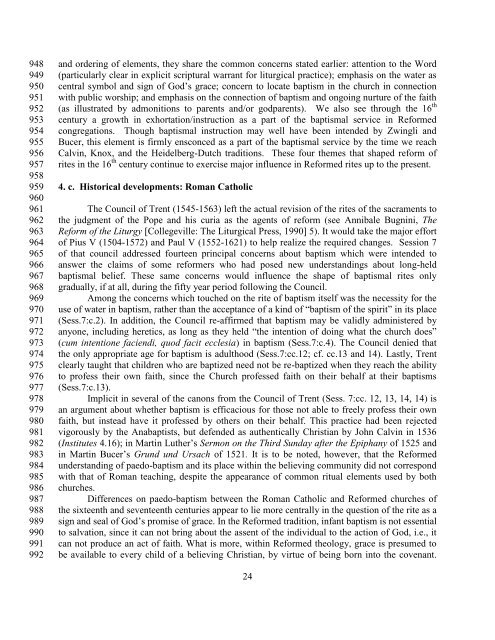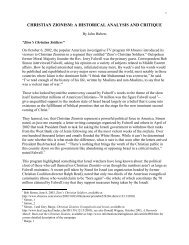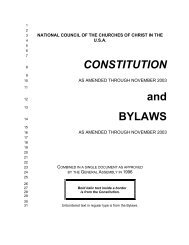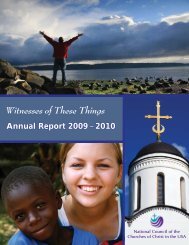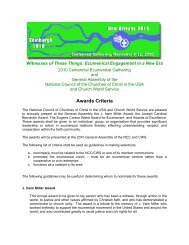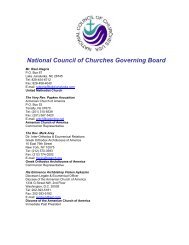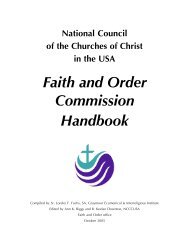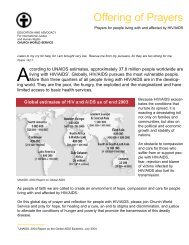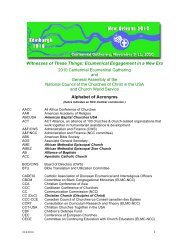Common Agreement on Mutual Recognition of Baptism - National ...
Common Agreement on Mutual Recognition of Baptism - National ...
Common Agreement on Mutual Recognition of Baptism - National ...
Create successful ePaper yourself
Turn your PDF publications into a flip-book with our unique Google optimized e-Paper software.
948<br />
949<br />
950<br />
951<br />
952<br />
953<br />
954<br />
955<br />
956<br />
957<br />
958<br />
959<br />
960<br />
961<br />
962<br />
963<br />
964<br />
965<br />
966<br />
967<br />
968<br />
969<br />
970<br />
971<br />
972<br />
973<br />
974<br />
975<br />
976<br />
977<br />
978<br />
979<br />
980<br />
981<br />
982<br />
983<br />
984<br />
985<br />
986<br />
987<br />
988<br />
989<br />
990<br />
991<br />
992<br />
and ordering <strong>of</strong> elements, they share the comm<strong>on</strong> c<strong>on</strong>cerns stated earlier: attenti<strong>on</strong> to the Word<br />
(particularly clear in explicit scriptural warrant for liturgical practice); emphasis <strong>on</strong> the water as<br />
central symbol and sign <strong>of</strong> God‘s grace; c<strong>on</strong>cern to locate baptism in the church in c<strong>on</strong>necti<strong>on</strong><br />
with public worship; and emphasis <strong>on</strong> the c<strong>on</strong>necti<strong>on</strong> <strong>of</strong> baptism and <strong>on</strong>going nurture <strong>of</strong> the faith<br />
(as illustrated by adm<strong>on</strong>iti<strong>on</strong>s to parents and/or godparents). We also see through the 16 th<br />
century a growth in exhortati<strong>on</strong>/instructi<strong>on</strong> as a part <strong>of</strong> the baptismal service in Reformed<br />
c<strong>on</strong>gregati<strong>on</strong>s. Though baptismal instructi<strong>on</strong> may well have been intended by Zwingli and<br />
Bucer, this element is firmly ensc<strong>on</strong>ced as a part <strong>of</strong> the baptismal service by the time we reach<br />
Calvin, Knox, and the Heidelberg-Dutch traditi<strong>on</strong>s. These four themes that shaped reform <strong>of</strong><br />
rites in the 16 th century c<strong>on</strong>tinue to exercise major influence in Reformed rites up to the present.<br />
4. c. Historical developments: Roman Catholic<br />
The Council <strong>of</strong> Trent (1545-1563) left the actual revisi<strong>on</strong> <strong>of</strong> the rites <strong>of</strong> the sacraments to<br />
the judgment <strong>of</strong> the Pope and his curia as the agents <strong>of</strong> reform (see Annibale Bugnini, The<br />
Reform <strong>of</strong> the Liturgy [Collegeville: The Liturgical Press, 1990] 5). It would take the major effort<br />
<strong>of</strong> Pius V (1504-1572) and Paul V (1552-1621) to help realize the required changes. Sessi<strong>on</strong> 7<br />
<strong>of</strong> that council addressed fourteen principal c<strong>on</strong>cerns about baptism which were intended to<br />
answer the claims <strong>of</strong> some reformers who had posed new understandings about l<strong>on</strong>g-held<br />
baptismal belief. These same c<strong>on</strong>cerns would influence the shape <strong>of</strong> baptismal rites <strong>on</strong>ly<br />
gradually, if at all, during the fifty year period following the Council.<br />
Am<strong>on</strong>g the c<strong>on</strong>cerns which touched <strong>on</strong> the rite <strong>of</strong> baptism itself was the necessity for the<br />
use <strong>of</strong> water in baptism, rather than the acceptance <strong>of</strong> a kind <strong>of</strong> ―baptism <strong>of</strong> the spirit‖ in its place<br />
(Sess.7:c.2). In additi<strong>on</strong>, the Council re-affirmed that baptism may be validly administered by<br />
any<strong>on</strong>e, including heretics, as l<strong>on</strong>g as they held ―the intenti<strong>on</strong> <strong>of</strong> doing what the church does‖<br />
(cum intenti<strong>on</strong>e faciendi, quod facit ecclesia) in baptism (Sess.7:c.4). The Council denied that<br />
the <strong>on</strong>ly appropriate age for baptism is adulthood (Sess.7:cc.12; cf. cc.13 and 14). Lastly, Trent<br />
clearly taught that children who are baptized need not be re-baptized when they reach the ability<br />
to pr<strong>of</strong>ess their own faith, since the Church pr<strong>of</strong>essed faith <strong>on</strong> their behalf at their baptisms<br />
(Sess.7:c.13).<br />
Implicit in several <strong>of</strong> the can<strong>on</strong>s from the Council <strong>of</strong> Trent (Sess. 7:cc. 12, 13, 14, 14) is<br />
an argument about whether baptism is efficacious for those not able to freely pr<strong>of</strong>ess their own<br />
faith, but instead have it pr<strong>of</strong>essed by others <strong>on</strong> their behalf. This practice had been rejected<br />
vigorously by the Anabaptists, but defended as authentically Christian by John Calvin in 1536<br />
(Institutes 4.16); in Martin Luther‘s Serm<strong>on</strong> <strong>on</strong> the Third Sunday after the Epiphany <strong>of</strong> 1525 and<br />
in Martin Bucer‘s Grund und Ursach <strong>of</strong> 1521. It is to be noted, however, that the Reformed<br />
understanding <strong>of</strong> paedo-baptism and its place within the believing community did not corresp<strong>on</strong>d<br />
with that <strong>of</strong> Roman teaching, despite the appearance <strong>of</strong> comm<strong>on</strong> ritual elements used by both<br />
churches.<br />
Differences <strong>on</strong> paedo-baptism between the Roman Catholic and Reformed churches <strong>of</strong><br />
the sixteenth and seventeenth centuries appear to lie more centrally in the questi<strong>on</strong> <strong>of</strong> the rite as a<br />
sign and seal <strong>of</strong> God‘s promise <strong>of</strong> grace. In the Reformed traditi<strong>on</strong>, infant baptism is not essential<br />
to salvati<strong>on</strong>, since it can not bring about the assent <strong>of</strong> the individual to the acti<strong>on</strong> <strong>of</strong> God, i.e., it<br />
can not produce an act <strong>of</strong> faith. What is more, within Reformed theology, grace is presumed to<br />
be available to every child <strong>of</strong> a believing Christian, by virtue <strong>of</strong> being born into the covenant.<br />
24


